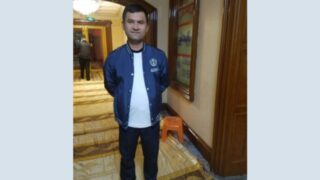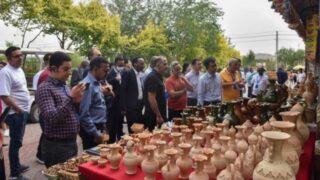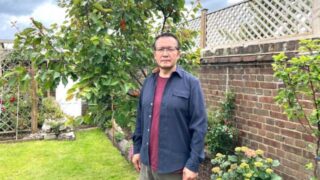After the Urumqi fire, it is time for the international community to stop the genocide. Perhaps a poem may help.
by Aziz Isa Elkun


Introduction by Ruth Ingram: A deadly fire in the Uyghur heartland sparking riots and protests throughout China not seen since Tiananmen, propelled the Chinese government to hastily backtrack over its Zero COVID policy. Aziz Isa Elkun, Uyghur academic and poet, well known to Bitter Winter, describes his own thoughts about the fire and its aftermath. He remembers the sadness of Uyghur exiles like him and the victims’ families, scattered throughout the world for whom “moving on” is not an option. To his poem “Roses” (below), he adds a first verse to remember the Uyghur genocide, but roses that he has planted in his exiled garden remind him that it is still “beautiful to be alive” and to “live in peace in our beautiful world.”
Article by Aziz Isa Elkun:
In the recent tragedy of the Urumqi fire on the evening of the 24th of November, more than 44 Uyghurs perished inside their flats. This was as a direct result of the Chinese Government’s extreme Zero COVID policy in the Uyghur Autonomous Region (East Turkistan/Xinjiang) involving strict lockdown measures and a brutal crackdown on movement. This region has hosted the world’s largest network of internment camps built by the Chinese Government since 2016, in which more than one million Uyghurs and other Turkic people have been detained. They have been accused by the CCP of practising their Islamic beliefs, enjoying a distinct culture, speaking their own language, and having a different lifestyle from the majority Han Chinese population.
The response to this tragic fire finally broke the long silence held by most of the Han Chinese population inside China, who have also suffered under three months of lockdown. This tragedy led to nationwide protests in China for the first time since the Tiananmen student demonstration movement, that ended with several thousands of students being massacred in Beijing in 1989. At that time, I was an 18-year-old university student who actively participated in this protest.
It is not an overstatement to say that the Chinese authorities are responsible for the deaths of those in the Urumqi fire, and facts have been covered up under the pretext of the COVID-19 lockdown. The doors of the victims’ flats were sealed on the outside using chains and locks, and the entire building had been cordoned off by heavy barricades to prevent access. Some doors were welded together with metal bars. When the fire broke out on the 15th floor of the 21-storey residential building in the primarily Uyghur-concentrated residential area in Urumchi, the firefighters could not reach the 15th floor to extinguish the fire due to these COVID measures.
These victims were mostly women and children. The Chinese Government claims that only 10 people died in the fire. But according to social media posts from victims’ families, videos and photos of the loved ones who died in the fire, more than 44 Uyghurs who died in the fire have been identified and hundreds of others who were injured.
What was most heart-breaking for any Uyghur living in exile was to hear Serafet’s mournful voice as she spoke to the BBC’s Newsnight the day after the fire on December 5th 2022. Serafet is a Uyghur exile living in Turkey. Her mother, two of her brothers, and two sisters perished in the inferno.
But to date there has been no official confirmation from the Chinese Government about their deaths.
It is important to state that all these victims were Uyghur. There were no Han Chinese or other ethnic groups among the dead. We have also learned from the victims’ families in the diaspora that many of these women’s husbands and sons had been detained in internment camps. Most of the casualties were therefore women and children.


This is just the tip of the iceberg where crimes of the Chinese Government against Uyghurs are concerned. They have been suffering since 2017, when China established internment camps and arbitrarily locked up more than three million Uyghurs and other Turkic Muslims and subjected them to unspeakable atrocities. This recent horror is more evidence of the criminality of a regime whose reach extends also to countless exiles in the diaspora. I am one of those, who together with the victims’ families have been in anguish for the past five years.
It is 70 years since the People’s Republic of China re-occupied and re-colonized the Uyghur homeland of East Turkistan. Despite autonomy granted to the Uyghur region in 1955, the title “Xinjiang Uyghur Autonomous Region” proved to be a misnomer. So-called “autonomy” was never fully realised.
During, the 1950s and 1960s, any Uyghur who demanded cultural and religious freedom, justice and equal civil rights was tarred with the brush of “Pan Turkism” and “Pan Islamism.” Since that time, Uyghurs have experienced various forms of oppression. China has previously used measures of forced assimilation similar to those we see today. During the Cultural Revolution, Uyghur culture and religion were attacked, mosques were destroyed, Korans were burned, and many people were imprisoned.
In the 1990s, any dissident movements were immediately labelled and persecuted as crimes of “ethnic separatism” or “splitting the motherland.” After the terror attacks of 9/11, strict curbs were put on Uyghur political and social life. Those who opposed or protested CCP discrimination, inequality, or apartheid policies, risked arbitrary arrest, detention, and unlawful charges of “Islamic extremism” and “terrorism” against them.
Since 2016, the Uyghur political situation has deteriorated under Xi Jinping. Chen Quanguo was brought from Tibet to govern East Turkistan, and given sweeping powers to suppress Uyghur resistance and force assimilation. These policies started in 2016 in the guise of an “anti-terror campaign” whose aim was to eradicate Uyghur ethnic, cultural, and religious identity. Uyghur medium schools and mosques were closed. Police stations appeared on most street corners, some as close as every 100 metres, mimicking similar clampdowns in Tibet before 2016.
The international community widely recognizes the Chinese Regime as having committed genocide against Uyghurs and other Turkic peoples in the Uyghur homeland. December 9th has been designated by the Uyghur diaspora as Genocide Recognition Day to commemorate the verdict of the independent Uyghur Tribunal in London, December 2021. The UN Human Rights report released on August 31st, 2022, affirmed crimes against humanity committed by Chinese authorities in the region. Camp survivor testimonies and first hand witness accounts attest to the truth of these accusations.


Despite overwhelming evidence and international recognition however, no action has been taken to hold China accountable and those responsible for the suffering of the Uyghurs have yet to face their crimes. On the contrary, the suffering of the Uyghur people has increased; and many hundreds of thousands continue to languish behind the bars of the notoriously inhumane concentration camps.
This ongoing genocide must be stopped as a matter of great urgency. Every possible legal avenue must be explored under international law to save further destruction of human life. The Chinese government must be held accountable for its crimes against humanity and justice restored to the victims.
When genocide has become an undeniable fact, it is the duty of every human being to fight back. It is also the duty of all states that have undertaken to safeguard people from genocide to stand by their promise of “never again.”
To commemorate the first anniversary of the independent London Uyghur Tribunal’s verdict of genocide against the Uyghur people, I have added a new first verse to a poem I wrote for Mother’s Day last year. Since 2017, I have lost all contact with my mother and the rest of my family. I pray that my mother is alive. I pray for the well-being of all Uyghur mothers and fathers who have suffered because their children live abroad. They are the ones who have been paying the price as their exiled relatives speak out publicly and challenge the CCP’s crimes against their people.
We have faith in humanity. We hope one day, sooner or later, Xi Jinping and his CCP compatriots will be brought to justice for their crimes against humanity. Uyghur victims will never give up seeking justice for their loved ones until the perpetrators are punished.
“Roses”
(see original version)
The monster has left countless stains
It has pierced me with needles
But still I call for justice for those
Who have suffered more
But my spirit is still fighting
My hope is still alive
Each time I find new courage
It brings the joy of a smile.
The first rose I planted three years ago
To mark my father’s destroyed grave
The second rose I planted
On Mother’s Day last year
The third rose I planted for the unknown Uyghurs
Who survive inside the camps.
My roses are blossoming with hope
Singing a song of freedom
Without waiting for the spring
They remind us
How beautiful it is to be alive
To live in peace in our beautiful world.









